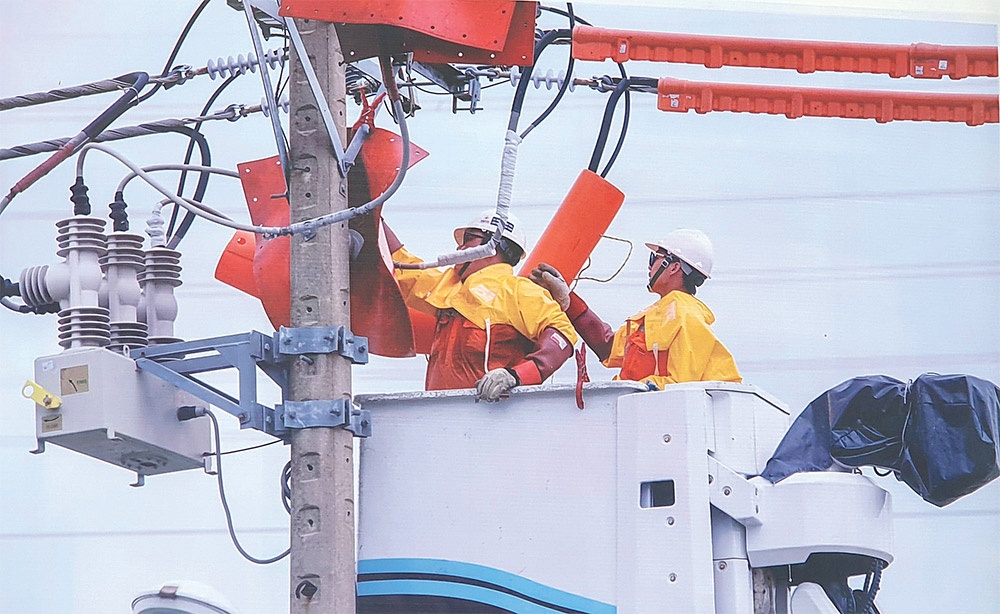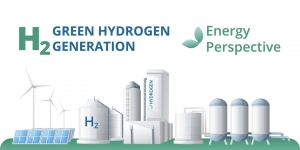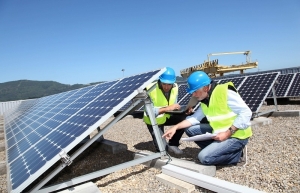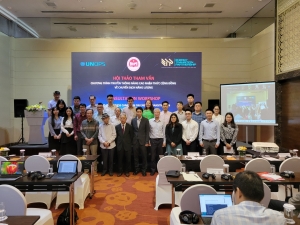Wide participation can boost nation’s energy transition
At a consultation workshop on the public awareness campaign for the energy transition held in Hanoi two weeks ago, experts emphasised that as many individuals and businesses as possible should participate in the energy transition process.
“Every action, no matter how small it is, such as saving electricity, recycling, and using environmentally friendly means of transportation and living, makes an important contribution to the overall effort to reduce environmental pollution and ensure energy security,” said Nguyen Ngoc Thuy, country coordinator of the Energy Transition Partnership.
Thuy noted that the energy transition is a multi-faceted issue, covering complex contents such as finance and investment, renewable energy infrastructure development, green jobs, and improving access to affordable clean energy for people in remote areas.
“It will open up numerous new doors for employment, advanced technology development, and socioeconomic growth. However, this may pose some challenges for economies, for example, how to minimise the impact on vulnerable groups and subjects, especially the impact of electricity price increases on poor households, and remarkable structural changes in industries related to fossil energy,” she added.
 |
| The annual growth rate of electricity demand here is increasingly higher than the economic growth rate, photo Le Toan |
According to the International Energy Agency, in a net-zero scenario, behavioural changes would reduce emissions and reduce energy demand for buildings, road transport, and aviation. The total amount of CO2 emissions in the period 2021-2050 is estimated to decrease by about 4 per cent if there are more effective energy-saving behaviours by authorities, organisations, businesses, and individuals.
In the 2023-2025 period, the annual growth rate of electricity demand in Vietnam is increasing by about 8.5 per cent, higher than the economic growth rate. So understanding various aspects of energy and behavioural change is important, Thuy added.
Realising the importance of the movement, numerous businesses have prepared specific strategies and plans to convert and adapt to the energy transition trend.
PetroVietnam Exploration Production Corporation (PVEP) in January updated its action programme to adapt to the energy transition. Dinh The Hung, head of Technology and Environmental Safety at PVEP, said that the newly updated action programme has set out specific goals and solutions to implement and adapt to the energy transition trend.
“They include applying new environmentally friendly technologies, shifting product structure towards increasing the proportion of gas compared to oil, and implementing carbon collection and storage projects, among other areas. These solutions will help PVEP gradually adapt to the current trend and contribute to the energy transition of the country,” Hung said.
The corporation is focused on groups of solutions like managing the implementation of energy transition, energy management, net emission reduction, and recycled energy. These include nine tasks and over 80 specific actions for each department to follow.
Meanwhile, the Ministry of Natural Resources and Environment has compiled lists of priority projects to implement the Just Energy Transition Partnership starting in 2024, including Pha Lai Thermal Power Corporation (PPC). Pha Lai 1 coal thermal power plant will use 100 per cent suitable fuel, without carbon emissions for four units. If possible, the Pha Lai 2 coal thermal power plant will switch to using 100 per cent suitable fuel without carbon emissions by gradually switching from co-firing to absorption.
PPC chairman Mai Quoc Long said, “We aim to reduce greenhouse gas emissions, hit net-zero emissions by 2050, and contribute positively to the international community in protecting the earth’s climate, shifting the growth model to improve the economy’s resilience and competitiveness.”
However, the transition from using fossil fuels to using clean fuels struggles with big issues, Long warned. “Therefore, we need the support of relevant ministries and agencies to provide policies, quickly approve procedures, and create stronger conditions for investments and technical assistance,” he added.
| Pham Minh Hung, deputy director Department of Industrial and Service Economy Ministry of Planning and Investment The nation’s green financial strategy, outlined with specific orientations and solutions, particularly emphasises communication, education, and raising awareness as top priorities. This highlights the government’s commitment to enhancing community awareness and collective efforts in energy transition towards a sustainable future. The task of investment has been delegated, with the National Green Growth Strategy assigning ministries, localities, agencies, and related organisations to mature strategies and implement green growth initiatives. A proactive approach has been taken by the Ministry of Investment, issuing a proactive plan to execute the national green growth strategy, focusing on collaborative campaigns with local authorities to disseminate information, promote green lifestyles, and receive international support. The Southeast Asia Energy Transition Partnership, a United Nations Office for Project Services initiative, has actively supported the implementation of community awareness-raising programmes through various media channels, such as YouTube multi-event broadcasts, to advance the use of green and renewable energy in communities. What is more, consultation workshops have been organised to gather input from industry experts on specific communication plans, aiming to boost the adoption of green energy in communities. Looking ahead to 2025, stakeholders eagerly anticipate contributions and insights from participants to refine the communication plan, as presented by the technical consultants from YouTube at a recent workshop. Le Xuan Nghia, member National Financial and Monetary Policy Advisory Council Energy transition is an indispensable part of developing a green and sustainable economy. Energy use has significantly increased over the years, starting from the pre-industrial era and now reaching a level worth $426 billion. European scientists predict that the $500 billion limit will be achieved. The energy recovery rate from wind and solar power remains low, at only about 2.7 and 15-17 per cent, respectively. This poses a significant challenge for investing in renewable energy. However, Vietnam is facing some challenges, such as deforestation and water loss due to the development of rubber, coffee, and resin. Reducing emissions and transitioning to clean energy is becoming an important task, but it also requires cooperation and investment from both the government and businesses. In recent times, Vietnam has emerged as a potential leader in green energy development. By 2030, Vietnam is expected to import about 200 million tonnes of oil and gas. However, to achieve this goal, efforts must be made to invest in and develop renewable energy systems. Although the energy transition may face some challenges, it is not just an environmental issue. It is also related to economic and political issues. The government needs to enact policies and measures to promote this transition. Finally, we need to reconsider the role of humans in protecting the environment and resources. Energy transition is not only to meet current needs, but also to ensure a sustainable future for generations to come. We need to focus on investing in renewable energy and building a sustainable future for our country and planet. Nguyen Anh Tuan, vice permanent chairman and general secretary Vietnam Energy Association Tapping into our country’s vast potential in renewable energy sources such as solar, wind, and hydropower is a crucial part of building a sustainable future. Although currently, we only harness a small portion of this potential, in the future, as we begin to utilise energy sources from waves and tides, we will have even greater resources. In our country, about 900,000 people are waiting to enjoy solar energy, and approximately 800,000 people are waiting to install wind energy systems nationwide. However, despite the vast potential, the total capacity of the national renewable energy system currently meet the demand for about 80,000 people. An important goal we need to achieve in implementing energy transition is to reduce dependence on imported oil and fuel, reduce imported coal, and products from abroad. In the future, if we cannot maintain this situation, we will be too dependent on imports, possibly up to 75 per cent or more by 2050. This affects our energy self-sufficiency and increases dependence on political and economic fluctuations in neighbouring regions. Another important part of the energy transition process is the application of clean and environmentally friendly technologies. This not only helps us reduce negative impacts on the environment but also creates a more sustainable future for the country. To achieve this, we need to maximise resources and combine measures such as enhancing energy efficiency and developing renewable energy sources. Green energy production is an important to form a comprehensive picture of clean energy development in Vietnam. Our goal is to enhance energy supply and minimise negative impacts on the environment, thereby creating a sustainable future for the country. |
 | Vietnam showing special interest in hydrogen Hydrogen is one of Vietnam's priority areas as it focuses on implementing a green transformation strategy for the upcoming decades, according to Prime Minister Pham Minh Chinh. |
 | Studies underway to guide Vietnam’s energy transition Vietnam is being encouraged to craft a clear roadmap for the transition of Vietnam’s coal-fired power plants, which are facing risks of closure. |
 | Community awareness on energy transition is vital for progress Energy transition is a collective process, so to ensure active and voluntary participation from all stakeholders in society, a specific and meticulous communication plan is crucial, especially as the objectives align with Vietnam's pursuit of sustainable growth. |
What the stars mean:
★ Poor ★ ★ Promising ★★★ Good ★★★★ Very good ★★★★★ Exceptional
 Tag:
Tag:
Related Contents
Latest News
More News
- Trung Nam-Sideros River consortium wins bid for LNG venture (January 30, 2026 | 11:16)
- Vietnam moves towards market-based fuel management with E10 rollout (January 30, 2026 | 11:10)
- Envision Energy, REE Group partner on 128MW wind projects (January 30, 2026 | 10:58)
- Vingroup consults on carbon credits for electric vehicle charging network (January 28, 2026 | 11:04)
- Bac Ai Pumped Storage Hydropower Plant to enter peak construction phase (January 27, 2026 | 08:00)
- ASEAN could scale up sustainable aviation fuel by 2050 (January 24, 2026 | 10:19)
- 64,000 hectares of sea allocated for offshore wind surveys (January 22, 2026 | 20:23)
- EVN secures financing for Quang Trach II LNG power plant (January 17, 2026 | 15:55)
- PC1 teams up with DENZAI on regional wind projects (January 16, 2026 | 21:18)
- Innovation and ESG practices drive green transition in the digital era (January 16, 2026 | 16:51)






















 Mobile Version
Mobile Version